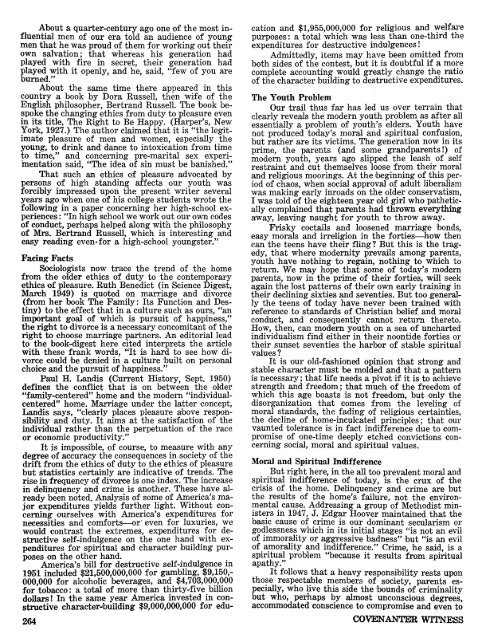Covenanter Witness Vol. 53 - Rparchives.org
Covenanter Witness Vol. 53 - Rparchives.org
Covenanter Witness Vol. 53 - Rparchives.org
Create successful ePaper yourself
Turn your PDF publications into a flip-book with our unique Google optimized e-Paper software.
defines the conflict that is on between the older"family-centered"home and the modern "individual-home. Marriage under the latter concept,Landis says, "clearly places pleasure above responsibility and duty. It aims at the satisfaction of theindividual rather than the perpetuation of the racecentered"productivity."or'apathy."About a quarter-century ago one of the most influential men of our era told an audience of youngmen that he was proud of them for working out theirown salvation; that whereas his generation hadplayed with fire in secret, their generation hadplayed with it openly, and he, said, "few of you areburned."About the same time there appeared in thiscountry a book by Dora Russell, then wife of theEnglish philosopher, Bertrand Russell. The 'book bespoke the changing ethics from duty to pleasure evenin its title, The Right to Be Happy. (Harper's, NewYork, 1927.) The author claimed that it is "the legitimate pleasure of men and women, especially theyoung, to drink and dance to intoxication from timeto time," and concerning pre-marital sex experimentation said, "The idea of sin must be banished."That such an ethics of pleasure advocated bypersons of high standing affects our youth wasforcibly impressed upon the present writer severalyears ago when one of his college students wrote thefollowing in a paper concerning her high-school experiences : "In high school we work out our own codesof conduct, perhaps helped along with the philosophyof Mrs. Bertrand Russell, which is interesting andeasy reading even- youngster."for a high-schoolFacing FactsSociologists now trace the trend of the homefrom the older ethics of duty to the contemporaryethics of pleasure. Ruth Benedict (in Science Digest,March 1949) is quoted on marriage and divorce(from her book The Family: Its Function and Destiny) to the effect that in a culture such as ours, "animportant goal of which is pursuit of happiness,"the right to divorce is a necessary concomitant of theright to choose marriage partners. An editorial leadto the book-digest here cited interprets the articlewith these frank words, "It is hard to see how divorce could be denied in a culture built on personalchoice and the pursuit of happiness."Paul H. Landis (Current History, Sept. 1950)or economicIt is impossible, of course, to measure with anydegree of accuracy the consequences in society of thedrift from the ethics of duty to the ethics of pleasurebut statistics certainly are indicative of trends. Therise in frequency of divorce is one index. The increasein delinquency and crime is another. These have already been noted. Analysis of some of America's major expenditures yields further light. Without conourselves with America's expenditures forcerningnecessities and comfortseven for luxuries, wewould contrast the extremes, expenditures for destructive self-indulgence on the one hand with expenditures for spiritual and character building purposes on the other hand.America's bill for destructive self-indulgence in1951 included $21,500,000,000 for gambling,$9,150,-000,000 for alcoholic beverages, and $4,703,000,000for tobacco : a total of more than thirty-five billiondollars! In the same year America invested in conedu-$9,000,000,000 forstructive character-^building264cation and $1,955,000,000 for religious and welfarepurposes : a total which was less than one-third theexpenditures for destructive indulgences!Admittedly, items may have been omitted fromboth sides of the contest, but it is doubtful if a morecomplete accounting would greatlychange the ratioof the character building to destructive expenditures.The Youth ProblemOur trail thus far has led us over terrain thatclearly reveals the modern youth problem as after allessentially a problem of youth's elders. Youth havenot produced today's moral and spiritual confusion,but rather are its victims. The generation now in itsprime, the parents (and some grandparents!) ofmodern youth, years ago slipped the leash of selfrestraint and cut themselves loose from their moraland religious moorings. At the beginning of this period of chaos, when social approval of adult liberalismwas making early inroads on the older conservatism,I was told of the eighteen year old girl who pathetically complained that parents had thrown everythingaway, leaving naught for youth to throw away.Frisky coctails and loosened marriage bonds,easy morals and irreligion in the forties how thencan the teens have their fling? But this is the tragedy, that where modernity prevails among parents,youth have nothing to regain, nothing to which toreturn. We may hope that some of today's modernparents, now in the prime of their forties, will seekagain the lost patterns of their own early training intheir declining sixties and seventies. But too generally the teens of today have never been trained withreference to standards of Christian belief and moralconduct, and consequently cannot return thereto.How, then, can modern youth on a sea of unchartedindividualism find either in their noontide forties ortheir sunset seventies the harbor of stable spiritualvalues ?It is our old-fashioned opinion that strong andstable character must be molded and that a patternis necessary ; that life needs a pivot if it is to achievestrength and freedom ; that much of the freedom ofwhich this age boasts is not freedom, but only thedis<strong>org</strong>anization that comes from the leveling ofmoralstandards, the fading of religious certainties,the decline of home-inculcated principles; that ourvaunted tolerance is in fact indifference due to compromise of one-time deeply etched convictions concerning social, moral and spiritual values.Moral and Spiritual IndifferenceBut right here, in the all too prevalent moral andspiritual indifference of today, is the crux of thecrisis of the home. Delinquency and crime are butthe results of the home's failure, not the environmental cause. Addressing a group of Methodist ministers in 1947, J. Edgar Hoover maintained that thebasic cause of crime is our dominant secularism <strong>org</strong>odlessness which in its initial stages "is not an evilof immorality or aggressive badness" but "is an evilof amorality and indifference." Crime, he said, is aspiritual problem "because it results from spiritualIt follows that a heavy responsibility rests uponthose respectable members of society, parents especially, who live this side the bounds of criminalitybut who, perhaps by almost unconscious degrees,accommodated conscience to compromise and even toCOVENANTER WITNESS
















